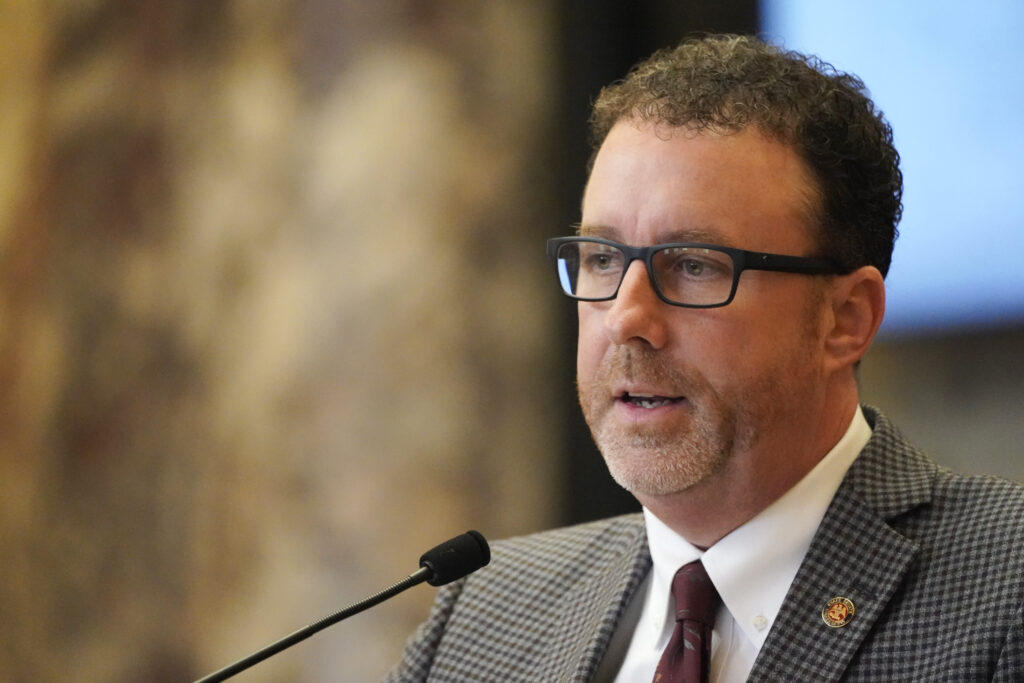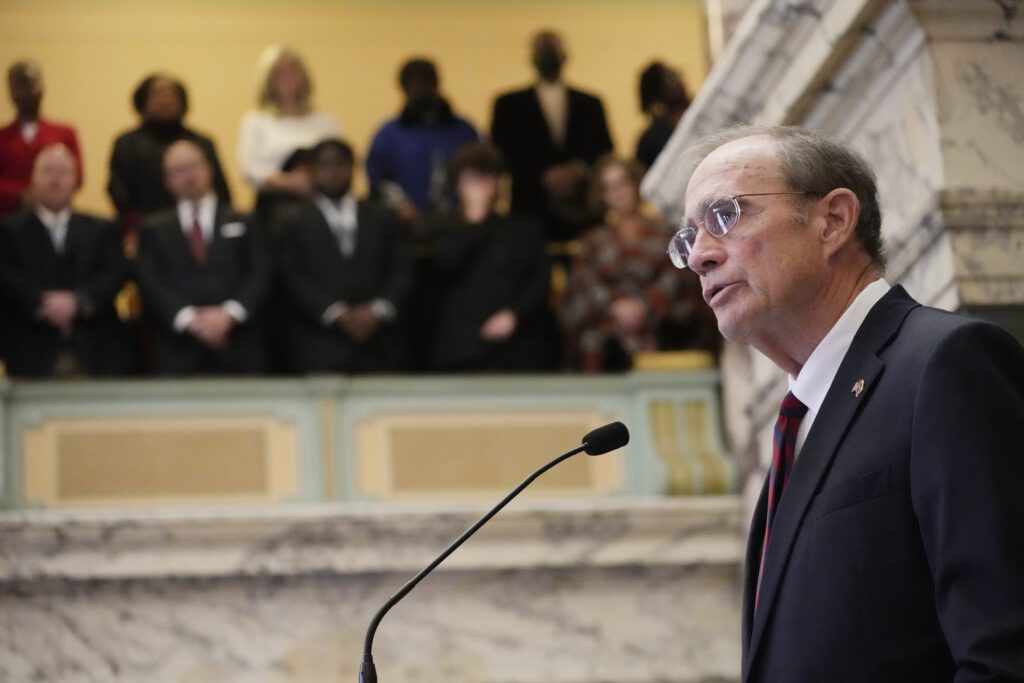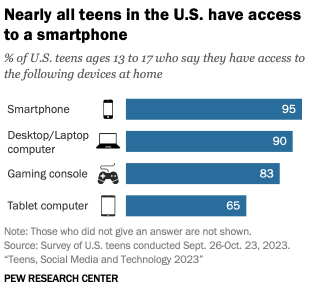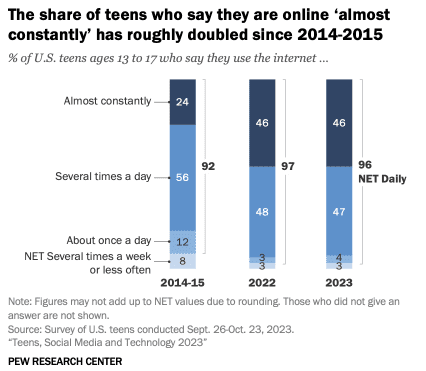
- Mississippi lawmakers, concerned that cellphones in school pose both a learning distraction and danger to mental health, are eyeing potential restrictions.
At least 15 states have enacted laws that ban or restrict students’ use of cellphones in public schools, or at a minimum, recommend local school districts enact their own bans or restrictions, according to an Education Week analysis published in June.
Mississippi could soon join the group.
Concerns over mental health and distractions in the classroom are largely driving the push among state lawmakers to curb cellphone use in schools.

The Mississippi Senate Mental Health Task Force took the issue up during a hearing last week. State Senator David Parker (R), chairman of the task force, told Magnolia Tribune that the group is researching best practices and looking at what is being done in other states.
“Through our work in the Mental Health Task Force over the past two months, we have analyzed and looked at data from many sources. Those sources include books like The Anxious Generation and feedback from leaders in education and mental health. We have also looked at actions being considered and taken in other states,” Parker said.
Senator Parker said his main concern is that during key instruction and interactive time, students are distracted and are unable to regain focus because of their phones.
“This is creating a crisis that is reflected in countless areas. I expect our task force to recommend that cellphone use be restricted during these key moments in education,” Parker added. “We continue to look at best practices to achieve this goal and hope to have a legislative method to help achieve this goal.”

Lt. Governor Delbert Hosemann (R) told Magnolia Tribune this week that vast research connects the decline in mental health among children and adolescents in part to the near constant use of smartphones and social media.
“Students should be concentrating on learning, not texting during classroom instruction. School safety and ensuring parents can stay connected with their children are also important concerns,” Hosemann said. “We support legislation to allow local districts to determine how best to negotiate these concerns while still protecting classroom learning from distractions like smartphone use.”
Critics of school cellphone bans have expressed concern that they could impede students’ ability to reach parents or authorities in emergency situations.
In July, Hosemann shared a news article on his Facebook page that highlighted the Marshall County School District’s new cellphone policy that bags and seals cellphones in pouches at the start of the school day. Teachers unlock the pouches for the students at the end of the day.
“Forward-thinking move by Marshall County schools! Research shows when students are engaged in learning, they are more likely to be physically and mentally healthy, show up for class, and be successful in the future,” Hosemann wrote on Facebook. “In the 2025 Session, we’ll be pushing for statewide cellphone restrictions in our public school classrooms.”
The Anxious Generation
Jonathan Haidt’s book The Anxious Generation was a topic of discussion at the Mississippi Senator Mental Health Task Force hearing, as mentioned by Senator Parker.
Haidt’s book was published this May and has been making its rounds among lawmakers and education leaders across the nation.

Haidt, a social psychologist at New York University’s Stern School of Business, analyzes the rise of the “phone-based childhood,” which he says began in the late 2000s and accelerated in the early 2010s.
“This was precisely the period during which adolescents traded in their flip phones for smartphones, which were loaded with social media platforms supported by the new high-speed internet and unlimited data plans,” Haidt states. “Few of us understood what was happening in children’s virtual worlds and we lacked the knowledge to protect them from tech companies that had designed their products to be addictive. For this reason, we ended up overprotecting children in the real world while underprotecting them in the virtual world.”
Haidt’s work seeks to explain the major causes of the international epidemic of mental illness that hit adolescents in the early 2010s, and offer a path forward for parents, teachers, friends, and relatives who want to help improve the mental health of children and adolescents.
In one section of the book, Haidt discusses the harms that result from the new “phone-based childhood,” with a chapter devoted to harms to girls, a chapter on harm to boys, and a chapter on the “spiritual degradation” that is happening from phone-based lives.
A book review authored by Tracy A. Dennis-Tiwary, a professor of psychology and neuroscience at Hunter College, in the New York Times contended that Haidt urged readers to “Choose human purity and sanctity over the repugnant forces of technology.”
“This dialectic is compelling, but the moral matrix of the problem — and the scientific foundations — are more complex,” Dennis-Tiwary wrote. “Yes, digital absolutism might convince policymakers to change laws and increase regulation. It might be a wake-up call for some parents. But it also might backfire, plunging us into defense mode and blocking our path of discovery toward healthy and empowered digital citizenship.”
Pew Research
The Pew Research Center released a survey in December 2023 that covered social media, internet use and device ownership among teens. The survey noted that nearly all teens in the U.S. have access to a smartphone.
“Our survey finds that most teens have or have access to a smartphone (95%), a desktop or laptop computer (90%), or a gaming console (83%). A smaller share – though still a 65% majority – say the same for tablets,” Pew stated.

The survey went on to state that smartphone ownership “is nearly universal among teens of different genders, ages, races and ethnicities, and economic backgrounds.”
As for teens’ time online, Pew’s survey found that nearly half say they use the internet “almost constantly” – a number that has roughly doubled over the last decade.
“This is on par with what we found last year, but roughly double the 24% who said this in the 2014-2015 survey,” Pew stated. “Overall, more than nine-in-ten say they use the internet at least daily.”

How Other States are Handling the Issue
This week, California became the latest state to enact cellphone restrictions. Governor Gavin Newsom (D) signed legislation into law that has been billed as a way to address students’ mental health.
“We know that excessive smartphone use increases anxiety, depression, and other mental health issues – but we have the power to intervene,” Newsom said in a statement. “This new law will help students focus on academics, social development, and the world in front of them, not their screens, when they’re in school.”

The California Phone-Free School Act requires every school district, charter school and county office of education to adopt a policy limiting or prohibiting the use of smartphones by July 1, 2026. It builds on legislation passed in 2019 which specified that California school districts have the authority to regulate the use of smartphones during school hours. In June of this year, Governor Newsome announced efforts to restrict the use of smartphones during the school day.
Below is a list of actions taken by states regarding cellphone bans or restrictions in schools, as outlined by Education Week.
Florida’s measures date back to May 2023 while the others have been undertaken in 2024.
- Alabama – State Board of Education recommended districts adopt a policy to limit cellphone use.
- Arkansas – Governor announced a pilot program to incentivize schools to restrict the use of cellphones.
- Connecticut – State Board of Education recommended guidelines for districts to adopt a policy for age-appropriate cellphone use.
- Delaware – Legislature approved $250,000 for a pilot program to be used as an incentive for districts to restrict cellphone use through the purchase of storage pouches.
- Florida – Law enacted to ban use of “wireless communication devices” during instructional time, with exceptions.
- Indiana – Law requires districts to adopt policies prohibiting use of wireless devices, with exceptions.
- Louisiana – Law prohibits use of cellphones on school grounds.
- Minnesota – Law requires districts adopt a policy to limit cellphone use.
- Ohio – Law requires districts adopt a policy to limit cellphone use.
- Oklahoma – Governor issued an executive order for Oklahoma Phone-Free School Challenge, recommending district adopt cellphone use limits.
- Pennsylvania – School safety law expanded to allow the purchase of lockable cellphone bags, and districts are encouraged to adopt cellphone use policies.
- South Carolina – Law requires districts to adopt a cellphone policy to receive state aid funding.
- Virginia – Governor issued an executive order that sets a deadline for school districts to adopt “policies and procedures” by January 2025.
- Washington – State Superintendent recommended districts adopt a policy to limit cellphone use.











